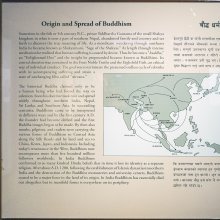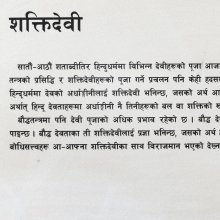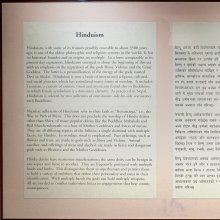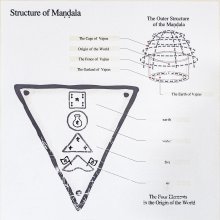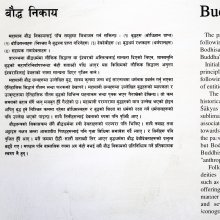Nai, Naī, Nāi, Ñai, Ṉai: 11 definitions
Introduction:
Nai means something in Hinduism, Sanskrit, Marathi, Jainism, Prakrit, Hindi, biology, Tamil. If you want to know the exact meaning, history, etymology or English translation of this term then check out the descriptions on this page. Add your comment or reference to a book if you want to contribute to this summary article.
Images (photo gallery)
(+1 more images available)
In Hinduism
Ayurveda (science of life)
Source: Advances in Zoology and Botany: Ethnomedicinal List of Plants Treating Fever in Ahmednagar District of Maharashtra, IndiaNāi in the Marathi language refers to the medicinal herb “Enicostema axillare (Lam.) Raynal”, and is used for ethnomedicine treatment of Fever in Ahmednagar district, India. The parts used are: “Roots”.

Āyurveda (आयुर्वेद, ayurveda) is a branch of Indian science dealing with medicine, herbalism, taxology, anatomy, surgery, alchemy and related topics. Traditional practice of Āyurveda in ancient India dates back to at least the first millenium BC. Literature is commonly written in Sanskrit using various poetic metres.
Biology (plants and animals)
Source: Wisdom Library: Local Names of Plants and DrugsNai in the Hindi language is the name of a plant identified with Vanda tessellata (Roxb.) Hook. ex G.Don from the Orchidaceae (Orchid) family having the following synonyms: Epidendrum tessellatum, Vanda roxburghii, Cymbidium tessellatum. For the possible medicinal usage of nai, you can check this page for potential sources and references, although be aware that any some or none of the side-effects may not be mentioned here, wether they be harmful or beneficial to health.
Source: Google Books: CRC World Dictionary (Regional names)1) Nai in India is the name of a plant defined with Enicostema axillare in various botanical sources. This page contains potential references in Ayurveda, modern medicine, and other folk traditions or local practices It has the synonym Hippion littorale (Blume) Miq. (among others).
2) Nai is also identified with Hordeum vulgare It has the synonym Zeocriton distichon (L.) P. Beauv. (etc.).
3) Nai is also identified with Rauvolfia serpentina It has the synonym Ophioxylon trifoliatum Gaertn. (etc.).
4) Nai is also identified with Vanda tessellata It has the synonym Cymbidium tessellatum (Roxb.) Sw. (etc.).
Example references for further research on medicinal uses or toxicity (see latin names for full list):
· Adansonia (1969)
· Systema Vegetabilium (1825)
· Acta Pharmacol. Toxicol. (Copenh) (1986)
· Numer. List (7318)
· Familles des Plantes (1763)
· Science and Culture (1982)
If you are looking for specific details regarding Nai, for example chemical composition, health benefits, diet and recipes, pregnancy safety, extract dosage, side effects, have a look at these references.

This sections includes definitions from the five kingdoms of living things: Animals, Plants, Fungi, Protists and Monera. It will include both the official binomial nomenclature (scientific names usually in Latin) as well as regional spellings and variants.
Languages of India and abroad
Marathi-English dictionary
Source: DDSA: The Molesworth Marathi and English Dictionarynaī (नई).—f unc A river. Pr. ikaḍē naī tikaḍē vaī.
--- OR ---
nāī (नाई).—f A plant, Sphæranthus Indicus. 2 A particular creeping plant.
Source: DDSA: The Aryabhusan school dictionary, Marathi-Englishnaī (नई).—f A river. Ex. īkaḍē naī tikaḍē vaī.
Marathi is an Indo-European language having over 70 million native speakers people in (predominantly) Maharashtra India. Marathi, like many other Indo-Aryan languages, evolved from early forms of Prakrit, which itself is a subset of Sanskrit, one of the most ancient languages of the world.
Sanskrit dictionary
Source: Cologne Digital Sanskrit Dictionaries: Monier-Williams Sanskrit-English DictionaryNai (नै):—Vṛddhi form of ni in [compound]
Sanskrit, also spelled संस्कृतम् (saṃskṛtam), is an ancient language of India commonly seen as the grandmother of the Indo-European language family (even English!). Closely allied with Prakrit and Pali, Sanskrit is more exhaustive in both grammar and terms and has the most extensive collection of literature in the world, greatly surpassing its sister-languages Greek and Latin.
Hindi dictionary
Source: DDSA: A practical Hindi-English dictionary1) Naī (नई):—(a) new; fem. of [nayā] (see); —[āvatī] fresh receipt; —[navelī] young and new; —[nikora] brand new.
2) Nāī (नाई):—(nm) a barber, a low caste in the traditional Hindu social order subsisting on haircutting, shaving, etc.; -[telī-dhobī] the butcher, the baker, the candlestickmaker.
...
Prakrit-English dictionary
Source: DDSA: Paia-sadda-mahannavo; a comprehensive Prakrit Hindi dictionary1) Ṇai (णै) in the Prakrit language is related to the Sanskrit word: Nati.
2) Ṇaī (णई) also relates to the Sanskrit word: Nadī.
3) Ṇāi (णाइ) also relates to the Sanskrit word: Jñāti.
4) Ṇāi (णाइ) also relates to the Sanskrit word: Jñati.
Prakrit is an ancient language closely associated with both Pali and Sanskrit. Jain literature is often composed in this language or sub-dialects, such as the Agamas and their commentaries which are written in Ardhamagadhi and Maharashtri Prakrit. The earliest extant texts can be dated to as early as the 4th century BCE although core portions might be older.
Kannada-English dictionary
Source: Alar: Kannada-English corpusNai (ನೈ):—
1) [noun] butter clarified by boiling; ghee.
2) [noun] a thick, sweet, syrupy substance that bees make as food from the nectar of flowers; honey.
3) [noun] any of various kinds of substances that are unctuous, viscous, combustible, liquid at ordinary temperatures, and soluble in ether or alcohol but not in water, extracted mainly from seeds of various plants; oil.
4) [noun] the typical quality of oils, being oily, greasy, viscous, etc.; oiliness.
Kannada is a Dravidian language (as opposed to the Indo-European language family) mainly spoken in the southwestern region of India.
Tamil dictionary
Source: DDSA: University of Madras: Tamil LexiconÑai (ஞை) . The compound of ஞ் [gn] and ஐ. [ai.]
--- OR ---
Ṇai (ணை) . The compound of ண் [n] and ஐ. [ai.]
--- OR ---
Nāi (நாஇ) noun [K. Travancore usage nāyi.] See நாய். [nay.] (தொல். எழுத். [thol. ezhuth.] 58, உரை. [urai.])
--- OR ---
Nai (நை) . The compound of ந் [n] and ஐ. [ai.]
--- OR ---
Nai (நை) [naital] 4 intransitive verb cf. naś.
1. To be crushed, bruised; நசுங்குதல். [nasunguthal.]
2. To be injured, spoiled, over-ripe, as fruits; to be frayed, worn out, as cloth; நிலைகெடுதல். [nilaigeduthal.]
3. To waste away, perish; கெடுதல். [keduthal.] (W.)
4. To dwindle, decrease; சுருங்குதல். நையாத வாயுளுஞ் செல்வமும் [surunguthal. naiyatha vayulugn selvamum] (திருவருட்பா [thiruvarudpa], v, பொது. [pothu.] 2.)
5. To be shortened in quantity, as a vowel; மாத்திரையிற் குறைதல். வன்மைமே லுகர முறுவது நையும் [mathiraiyir kuraithal. vanmaime lugara muruvathu naiyum] (வீரசோழீயம் சந்தி. [virasozhiyam santhi.] 2).
6. To droop, languish, faint; தளர்தல். இடைநைவது கண்டு [thalarthal. idainaivathu kandu] (திருக்கோவையார் [thirukkovaiyar] 134).
7. To fade; வாடுதல். [vaduthal.] (W.)
8. To be wounded in one’s feelings; to be distressed; மனம் வருந்துதல். நைந்து சாமவர்க்கே [manam varunthuthal. nainthu samavarkke] (திருநூற்றந்தாதி [thirunurrandathi] 43).
9. To feel pity; இரங்குதல். நீ நல்காமையி னைவரச் சாஅய் [iranguthal. ni nalkamaiyi naivaras saay] (புறநானூறு [purananuru] 146).
10. To forget oneself; to lose command of oneself; அவசமாதல். அரிவை நைய [avasamathal. arivai naiya] (சீவகசிந்தாமணி [sivagasindamani] 492).
--- OR ---
Nai (நை) [naittal] 11 transitive verb Causative of நை²-. [nai²-.]
1. To crush; நசுக்குதல். [nasukkuthal.]
2. To destroy; அழித் தல். வேலே . . . நாடுநைத்தலின் [azhith thal. vele . . . nadunaithalin] (புறநானூறு [purananuru] 97).
3. To burn; எரித்தல். ஒள்ளெரி நைப்ப [erithal. olleri naippa] (புறநானூறு [purananuru] 240).
--- OR ---
Nai (நை) interjection Expr. signifying disdain or mockery; இகழ்ச்சிக்குறிப்பு. [igazhchikkurippu.] (W.)
--- OR ---
Ṉai (னை) . The compound of ன் [n] and ஐ. [ai.]
Tamil is an ancient language of India from the Dravidian family spoken by roughly 250 million people mainly in southern India and Sri Lanka.
Nepali dictionary
Source: unoes: Nepali-English DictionaryNai (नै):—particle. an emphatic word used separately to give emphasis;
Nepali is the primary language of the Nepalese people counting almost 20 million native speakers. The country of Nepal is situated in the Himalaya mountain range to the north of India.
See also (Relevant definitions)
Starts with (+653): Nai bin shan li dou, Nai habarala, Nai han xun zi, Nai hua, Nai kadugu, Nai koppu, Nai manjal, Nai sang, Nai tulasi, Nai tung, Nai-cheru, Nai-naienal, Nai-pagal, Nai-shakar, Nai-thulasi, Naia, Naia, Naianchi-katti, Naiba, Naibaddhaka.
Ends with (+1192): A-kamavinai, A-kucalavetanai, Acaranai, Acaravinai, Acariyapucanai, Acarya-pujanai, Accanai, Accittinai, Achunai, Acur-vacalattavanai, Adamanai, Adhikara-varttanai, Adutheenda palai ennai, Ainkanai, Ainnai, Aintinai, Aiyakkatinai, Ajahattilakshanai, Ajakallakshanai, Akan-aintinai.
Full-text (+233): Nai-naienal, Nahi, Naistrimshika, Naishreyasa, Naish, Naisargika, Naihsargika, Naishkritika, Naai kadichchaan, Haskanit naim, Naai vealai elai, Naim el-salib, Naihsangya, Naihsprihya, Naimisheya, Naipunyena, Naishadaka, Naidhruvi, Naigamabhidhana, Naimishi.
Relevant text
Search found 30 books and stories containing Nai, Naī, Nāī, Nāi, Ṇai, Ṇaī, Ṇāi, Ñai, Ṉai, Naai, Gnai; (plurals include: Nais, Naīs, Nāīs, Nāis, Ṇais, Ṇaīs, Ṇāis, Ñais, Ṉais, Naais, Gnais). You can also click to the full overview containing English textual excerpts. Below are direct links for the most relevant articles:
Tattvartha Sutra (with commentary) (by Vijay K. Jain)
Bhagavati-sutra (Viyaha-pannatti) (by K. C. Lalwani)
Chapter 9: Sphere of time < [Book 2]
Chaitanya Bhagavata (by Bhumipati Dāsa)
Verse 1.15.71 < [Chapter 15 - Marriage with Śrī Viṣṇupriyā]
Verse 1.10.34-35 < [Chapter 10 - Marriage with Śrī Lakṣmīpriyā]
Verse 1.16.153 < [Chapter 16 - The Glories of Śrī Haridāsa Ṭhākura]
Maha Prajnaparamita Sastra (by Gelongma Karma Migme Chödrön)
Appendix 4 - Notes on the bhikṣus Ma (Aśvaka) and Tsing (Punarvasuka) < [Chapter XXVI - Exertion]
Appendix 13 - The story of Sunetra < [Chapter XIV - Emission of rays]
Story of Bimbisāra at Āmrapāli’s home < [Part 2 - Means of acquiring meditation]
Bhajana-Rahasya (by Srila Bhaktivinoda Thakura Mahasaya)
Text 9 < [Chapter 3 - Tṛtīya-yāma-sādhana (Pūrvāhna-kālīya-bhajana–niṣṭhā-bhajana)]
Text 14 < [Chapter 4 - Caturtha-yāma-sādhana (Madhyāhna-kālīya-bhajana–ruci-bhajana)]
Text 4 < [Chapter 2 - Dvitīya-yāma-sādhana (Prātaḥ-kālīya-bhajana)]
Manusmriti with the Commentary of Medhatithi (by Ganganatha Jha)
Verse 2.59 < [Section XIII - Initiation (upanayana)]
